Hiring a B2B Startup Consultant to Unlock Growth

Ever wonder what a startup consultant really is? Think of them as a seasoned guide for your entrepreneurial journey. They're the experts you bring in to provide strategic guidance and hands-on support, helping your new B2B venture navigate those make-or-break growth stages.
They’re not just another voice in a meeting; they’re an external partner with specialized knowledge, ready to roll up their sleeves and help you solve specific challenges—from nailing product-market fit to getting ready for your big funding round.
What Does a Startup Consultant Actually Do?
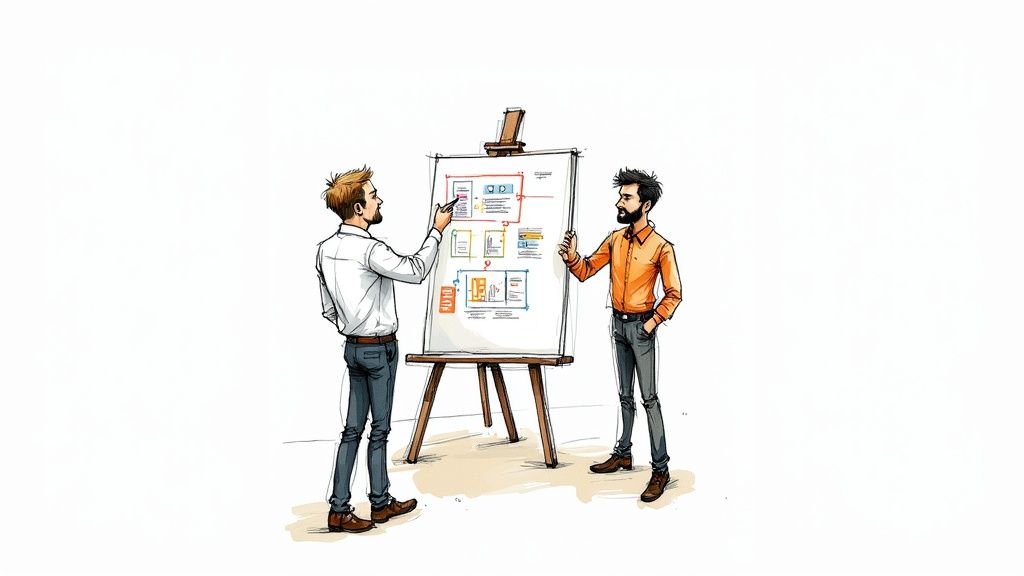
Imagine trying to build a complex piece of IKEA furniture, but the instructions are blurry and you’re missing half the tools. You'd probably get it done eventually, but it would be a slow, frustrating process filled with costly mistakes.
For a B2B founder, a startup consultant is the pro who shows up with the crystal-clear blueprint, the right tools, and the experience of having built that exact thing a hundred times before.
When you and your team are deep in the weeds of day-to-day operations, it's almost impossible to see the bigger picture. A consultant brings that crucial outside perspective, helping you spot the blind spots and uncover opportunities you’d otherwise miss.
Their role isn’t just about talking strategy; it’s about taking action to solve the real, pressing pain points that keep B2B founders up at night.
Bridging Critical Gaps in Your B2B Startup
Founders are constantly pulled in a dozen different directions, wearing every hat from CEO to salesperson. A consultant brings focused, specialized expertise to the table, filling in the gaps where the founding team might be stretched thin. This frees you up to focus on what you do best: building an amazing product.
For B2B SaaS companies, these challenges are often laser-focused:
- Finding Product-Market Fit: They guide you from a good idea to a must-have solution that solves a real, painful problem for a specific business audience.
- Scaling the Team: They offer proven frameworks for hiring the right talent at the right time, helping you avoid the common blunders that can wreck a company's culture and momentum.
- Preparing for Funding: They help you craft a compelling story, build a rock-solid financial model, and polish a pitch deck that genuinely connects with investors.
This need for specialized help is massive. The global management consulting market, which startup consulting is a part of, is valued at over $1 trillion as of 2025 and is only expected to grow.
A great consultant doesn’t just hand you a map. They walk the first few miles of the toughest terrain with you, helping you sidestep the hidden pitfalls and build real momentum for the journey ahead.
A Partner in Strategic Execution
At the end of the day, a startup consultant is far more than just an advisor—they're a partner in execution. They help you turn your big vision into a clear, actionable roadmap. Whether that means sharpening your go-to-market strategy or fine-tuning your sales process, their goal is to accelerate your growth and build a more resilient company.
This role can sometimes overlap with other specialists. For example, a fractional CMO dives deep specifically on building and running your marketing engine, while a general startup consultant might offer broader strategic guidance. Understanding these differences, which you can explore in our guide on what a fractional CMO does, helps you find the perfect expert for your most pressing needs.
Hiring one isn’t a luxury; it’s an investment in avoiding expensive mistakes and seizing opportunities before other businesses do.
The Core Services a Startup Consultant Delivers
A startup consultant’s real worth isn't in high-level theories; it’s in the tangible, hands-on work they do to push your business forward. Their services aren't some generic package. Instead, they deliver a specific set of actions designed to strengthen the very foundation of your B2B startup. They roll up their sleeves to build, refine, and optimize the systems that separate success from stagnation.
Think of your startup as a high-performance engine. A great consultant is the master mechanic who tunes every single component for maximum output. They don't just point out what’s wrong; they get in there with you and help fix it, making sure every part works in perfect harmony.
Crafting a Winning Go-to-Market Strategy
One of the most critical things a consultant does is build a powerful go-to-market (GTM) strategy. So many early-stage B2B companies have a brilliant product but absolutely no clear plan for connecting it with the right buyers. They end up casting a wide net, hoping to catch anyone, which just burns through precious time and money.
A consultant brings focus. They’ll work side-by-side with you to define your ideal customer profile (ICP) with surgical precision, mapping out their specific needs and the triggers that make them buy. A consultant's expertise is gold when it comes to identifying customer pain points that matter, which prevents founders from wasting months building features nobody will ever pay for.
For example, a fintech SaaS might start out targeting "all small businesses." A consultant would help them zero in on a niche like "construction firms with 50-200 employees struggling with project-based invoicing," then build a laser-focused plan to reach them.
This process breaks down into a few key steps:
- Market Segmentation: Carving up the total addressable market into smaller, more winnable segments.
- Customer Persona Development: Building out rich, detailed profiles of your ideal buyers—their roles, their goals, and what keeps them up at night.
- Positioning and Messaging: Nailing a clear, compelling value proposition that speaks directly to your target audience.
By concentrating your efforts, you create a direct line to revenue instead of just wandering through the market and hoping for a lucky break.
Optimizing the Sales Process for Scalability
Another core job for a startup consultant is to sharpen your sales process. In the early days, sales are usually founder-led and a bit chaotic—driven by pure grit and willpower. That’s amazing, but it doesn't scale. A consultant helps you bottle that magic, turning the art of the sale into a repeatable science.
They’ll dive deep into your entire sales funnel, from the first lead to the final signature, hunting for bottlenecks and opportunities. This could mean setting up a CRM, crafting effective sales scripts, or training your very first sales hires. The goal is simple: build a predictable revenue machine.
An effective sales process is a startup's lifeblood. A consultant ensures it flows smoothly and consistently, pumping predictable revenue through the heart of the business so you can grow with confidence.
Building a strong sales engine is one piece of a much larger puzzle. If you want to learn more about structuring your entire growth plan, our guide to marketing strategy consulting for business growth provides a fantastic framework for getting sales and marketing perfectly aligned.
Preparing for Successful Fundraising
Raising capital is a full-time job. For founders already stretched to their limits, it can be an all-consuming distraction from actually running the business. A consultant specializing in fundraising becomes your strategic co-pilot, getting you ready to walk into investor meetings with confidence and walk out with the capital you need.
Their work goes way beyond just cleaning up your pitch deck. They help you craft a compelling story, build a financial model that can withstand scrutiny, and prepare you for the tough questions every investor is going to ask.
A fundraising consultant makes sure you have:
- A Clear and Concise Story: They help you articulate your vision, the problem you're solving, and your unique solution in a way that grabs an investor's attention from slide one.
- Rock-Solid Financials: You'll work together to develop projections and unit economics that show a clear path to profitability and a massive return on their investment.
- Investor Targeting: They help you identify and connect with the right VCs and angel investors—the ones whose portfolios and passions actually align with your B2B startup.
This level of preparation dramatically increases your odds of a successful fundraise, freeing you up to get back to what you do best: building an incredible company.
Key Benefits of Hiring a Startup Consultant
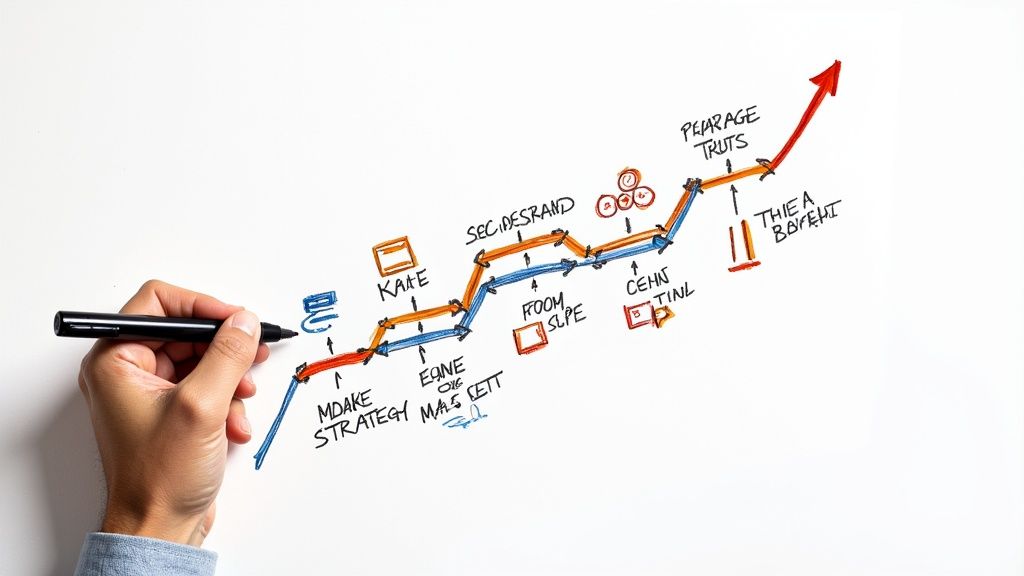
It’s one thing to know what a startup consultant does, but it’s another thing entirely to see the impact they can have on your business. Bringing in an expert isn’t just about checking off a to-do list; it’s about fundamentally shifting your company’s trajectory. A great consultant is a catalyst, injecting momentum where things have stalled and bringing order to the beautiful chaos of a startup.
Their value goes way beyond a simple list of deliverables. It shows up as faster growth, a stronger defense against common pitfalls, and access to opportunities you didn't even know existed. This is where a smart investment in outside expertise pays for itself many times over.
Achieve Rapid and Sustainable Growth
Let's be honest, the number one reason to bring in a consultant is to accelerate your growth. As a founder, you have the vision, but you can easily get stuck in the weeds, trying to figure out how to make it all happen. A consultant walks in with a playbook that's already been tested and refined, letting you skip past months—or even years—of expensive trial and error.
They’ve seen what works and, just as importantly, what doesn’t, across dozens of B2B companies like yours. That experience lets them pinpoint your best growth channels, tighten up your sales process, and craft a message that actually connects with your ideal customer. Instead of stumbling around in the dark, you get a clear path to scaling revenue. It's no surprise that a B2B consultant accelerates business growth by turning raw potential into real-world performance.
Drastically Reduce Business Risk
In a startup, every decision feels monumental, and one wrong move can set you back in a big way. Think of a seasoned consultant as your strategic co-pilot, helping you spot and navigate around risks before they become full-blown disasters. They bring a level-headed, objective view to your most critical choices.
Take building your first sales team, for instance. A founder might hire based on a good interview and a gut feeling, only to realize six months down the line that they’ve picked the wrong people for their specific B2B sales cycle. That’s an incredibly costly and demoralizing mistake.
A consultant brings a proven framework to the table for this exact challenge:
- They help you define the specific skills and background your team needs for your unique product.
- They build a scalable hiring and onboarding process so you can bring on great people consistently.
- They design compensation plans and metrics that actually motivate your sales reps to win.
By following this battle-tested approach, you avoid a catastrophic hiring blunder, saving tens of thousands of dollars and, more importantly, precious time and momentum. That’s risk reduction you can take to the bank.
A consultant's true value isn't just in the opportunities they help you seize, but in the disasters they help you skillfully avoid. Their experience becomes your company's ultimate insurance policy against common startup failures.
Gain Access to an Invaluable Network
Beyond their direct expertise, a top-tier consultant brings another massive asset: their network. After years in the trenches of the B2B world, they’ve built real relationships with a whole ecosystem of influential people. Suddenly, their network becomes your network, opening doors that would have otherwise been locked tight.
This access can be a game-changer in a few key ways:
- Investor Introductions: A warm intro from a trusted source to the right VC can be the difference between getting funded and having your email ignored.
- Strategic Partnerships: They can connect you with channel partners or tech collaborators who can put your growth on the fast track.
- Key Hires: A good consultant knows A-players who aren't even looking for a new gig but might be open to a conversation about the right opportunity.
The demand for this kind of guidance is only growing. The global market for startup consulting services was pegged at around $260 billion back in 2020 and has been climbing ever since. As more founders see the value in expert help, having a well-connected consultant is a powerful advantage.
How To Choose The Right B2B Startup Consultant
Finding the right startup consultant feels a lot like searching for a co-founder. This isn't just about hiring a contractor; it’s about bringing in a strategic partner who will fundamentally shape your company's future. The right person can unlock incredible growth. The wrong one can burn through precious capital and leave you with nothing to show for it.
Making a thoughtful, informed decision is one of the most critical moves you can make as a founder. It’s about having a clear framework for vetting candidates—moving beyond impressive resumes to find someone who genuinely gets your vision and has the scars to prove they can help you execute it.
This is your guide to getting it right.
Prioritize Deep Industry Specialization
Your very first filter should be a simple but powerful one: specialization. A generalist who claims to help "all startups" is a huge red flag. The challenges facing a B2B SaaS company are a world away from those of a direct-to-consumer brand or a hardware startup.
You need a consultant who lives and breathes your world. They should understand your market, speak your customers' language, and know the specific B2B sales cycles and marketing channels that actually move the needle. A consultant with a deep background in B2B SaaS already has a playbook for the exact challenges you're facing right now.
This intense focus is what separates good advice from game-changing guidance. A specialist can help you sidestep common industry pitfalls because they've seen dozens of other companies make them first.
Verify A Proven Track Record Of Tangible Results
Past performance is the single best predictor of future success. Don't get swept away by a slick presentation or a polished website. Your goal is to find cold, hard evidence that a consultant has delivered real, measurable results for companies just like yours.
This is where you need to do some digging.
During your conversations, push past vague claims of "driving growth." Ask for specific stories backed by data.
- "Walk me through a time you helped a B2B startup nail its go-to-market strategy. What was the outcome?"
- "Can you share an example of how you prepared a company for a funding round? What were the results?"
- "How do you define and measure success for an engagement like this?"
Look for consultants who can point to clear wins, like helping a client boost qualified leads by 30%, shortening their sales cycle, or successfully closing a funding round. These tangible outcomes are the true mark of an effective consultant.
The right consultant doesn't just offer opinions; they deliver outcomes. Their track record should be a story of specific problems solved and measurable value created, not a list of past clients.
This infographic shows a comparison of key metrics a B2B consultant might help improve, such as Customer Acquisition Cost versus Lifetime Value and Monthly Burn Rate versus Revenue Growth.
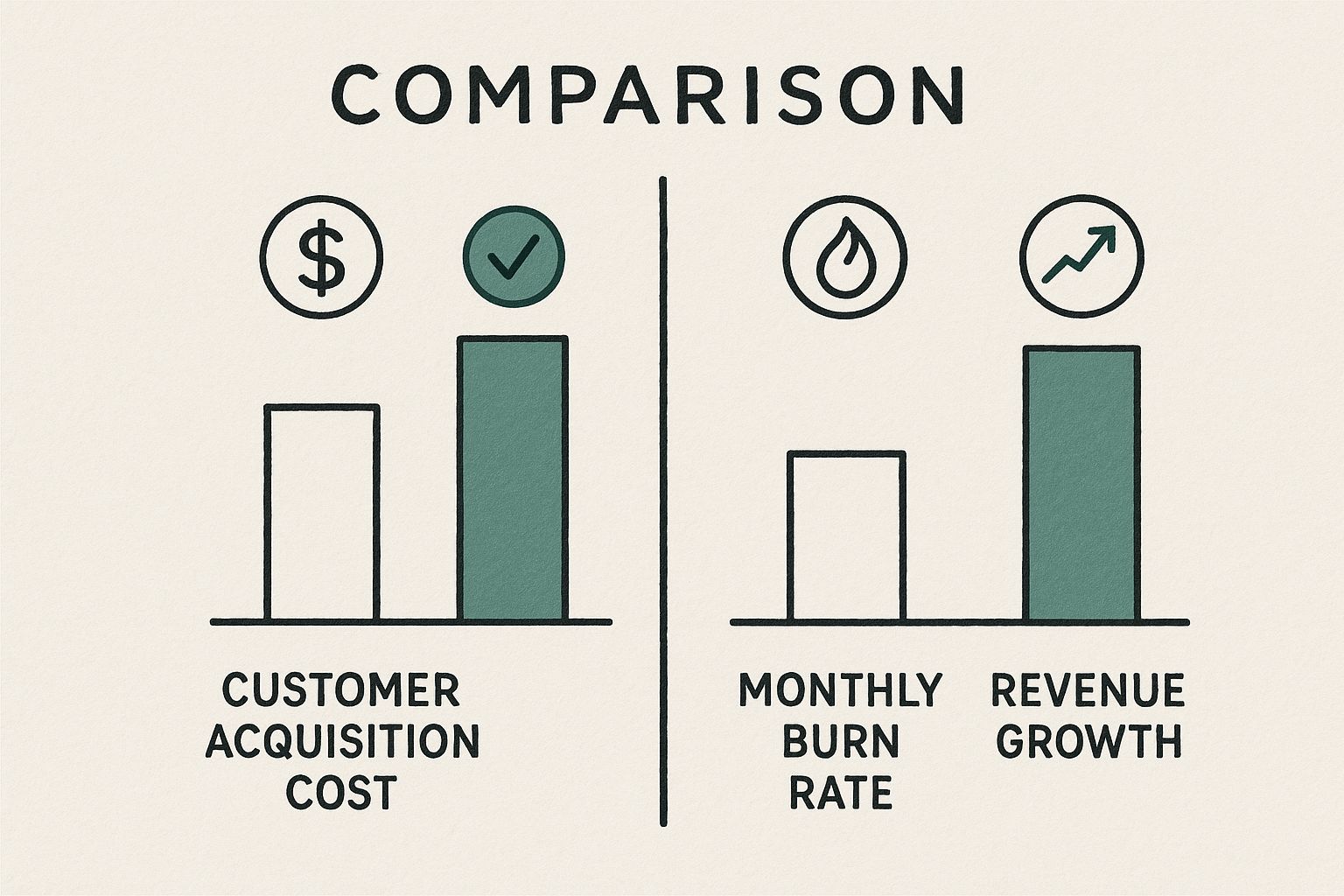
The visualization highlights the essential balance B2B startups must achieve—a great consultant helps drive down acquisition costs while increasing customer value, and ensures revenue growth outpaces the burn rate.
Comparing Consultant Types For Your B2B Startup
Choosing your partner isn't a one-size-fits-all decision. The type of consultant you need depends heavily on your stage, budget, and the specific problem you're trying to solve. Here’s a quick breakdown to help you find the right fit.
Each model offers a unique set of trade-offs. What matters most is aligning the consultant's structure and strengths with your startup's immediate needs and long-term goals.
Ensure Strong Cultural And Communication Alignment
Finally, you have to find someone who clicks with your team's culture and communication style. This person will be working shoulder-to-shoulder with you and your key people, so a strong working relationship is non-negotiable. They should feel like a natural extension of your team, not an outsider handing down orders.
During the interview process, pay close attention to the vibe.
- Do they listen more than they talk?
- Are they transparent about their process and what they’ll need from you?
- Do their values and work ethic resonate with your company culture?
This personal fit is just as crucial as their professional qualifications. A brilliant strategist who creates friction with your team will ultimately do more harm than good. Finding the right person often comes down to this perfect blend of skill and chemistry.
While a consultant provides the big-picture strategy, a specialized marketing agency can be the perfect partner for execution. If you're focused on building your growth engine, check out our guide on choosing an agency for B2B marketing to complement your consultant's work. By following this framework, you empower yourself to make a choice that will drive real, lasting value for your business.
Structuring Your Consultant Engagement for Success
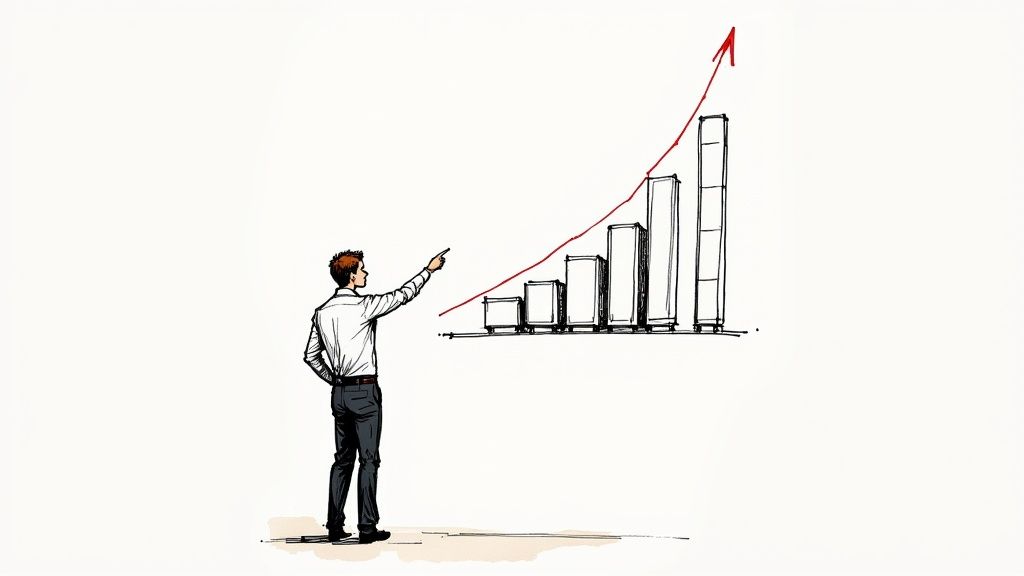
You’ve done the hard work and found the perfect B2B startup consultant. But finding the right person is only half the battle. How you actually build the partnership is just as critical.
Structuring the engagement isn't about signing a generic contract and hoping for the best. It’s about creating a shared vision for success. It’s about laying the groundwork for a relationship built on trust, clear expectations, and mutual accountability. Get this part right, and you turn a promising connection into a powerhouse collaboration that drives real results.
Choosing the Right Engagement Model
Let's be clear: not all consulting relationships are built the same. The right model for you depends entirely on what you need to accomplish, your timeline, and the specific challenge you’re facing.
Think of it like choosing the right tool for a job. You wouldn't use a sledgehammer for a delicate task. Similarly, you need to pick an engagement structure that fits your startup's current situation.
Here are the three most common ways to work with a startup consultant:
- Project-Based Engagements: This is a focused, short-term sprint with a clear finish line. It’s perfect when you have one specific, time-sensitive goal to crush.
- Retainer Agreements: Think of this as having an expert on speed dial. You pay a fixed monthly fee for ongoing access to advice, strategy, and support. It's built for the long haul.
- Fractional Advisory Roles: This is the deepest partnership. Your consultant essentially becomes a part-time executive, like a Fractional CMO or CFO, embedding themselves in your team for a set number of hours or days each month.
When to Use Each Model
The secret is to match the model to the mission.
A project-based engagement is your go-to for big, one-off milestones. Prepping for a Series A fundraising round? Developing a killer go-to-market strategy before a product launch? These are perfect examples. You get an intense burst of dedicated expertise focused on hitting a single, massive target.
A retainer, on the other hand, is built for the journey, not just the destination. It’s for when you need continuous help refining your sales process or tweaking your marketing message based on new customer feedback. A retainer ensures you have a strategic partner in your corner month after month, allowing them to develop a truly deep understanding of your business.
And a fractional advisory role? That's when you need C-suite brainpower but aren't ready for a full-time hire. It’s a game-changer for scaling startups, giving you executive-level strategy and oversight without the full-time cost.
The structure of your engagement isn't just a logistical detail—it defines the relationship. Choose a model that aligns with your goals to ensure your consultant is positioned to deliver maximum impact.
Defining Success with Clear KPIs
No matter which model you pick, you absolutely have to know what winning looks like. Before a single hour is billed, you and your consultant must agree on a concrete set of Key Performance Indicators (KPIs). These metrics are your North Star, making sure everyone is rowing in the same direction toward tangible outcomes.
Vague goals like "improve marketing" are a waste of everyone's time. You have to get specific.
- GTM Strategy Project: Increase marketing qualified leads (MQLs) by 25% within six months.
- Sales Process Retainer: Cut the average sales cycle from 90 days down to 65.
- Fundraising Project: Successfully close a seed round of at least $2 million.
Setting these benchmarks from day one is non-negotiable. It creates accountability and gives you a crystal-clear way to measure the return on your investment. Any consultant worth their salt will insist on this level of clarity.
The Importance of Scope and Communication
Alongside your KPIs, you need a rock-solid Scope of Work (SOW). This is the document that spells out exactly what the consultant will do, what the deliverables are, and just as importantly, what’s not included. It’s your best defense against scope creep and misunderstandings down the road.
This clarity is a fundamental part of building a Now, Next, Later roadmap to accelerate B2B growth, as it forces you to prioritize what truly matters.
Finally, set up a communication rhythm from the start. Will you have a weekly check-in call? A shared Slack channel for quick questions? A formal progress report each month? Defining this upfront keeps the partnership transparent and running smoothly. This simple recipe—clear goals, a defined scope, and consistent communication—is what separates a good consulting engagement from a great one.
Still Have Questions? Let's Clear Things Up.
Even after you've wrapped your head around what a consultant does and how a partnership might look, a few practical questions always pop up. It's completely normal. For B2B founders thinking about bringing on this kind of partner, getting straight answers to these common questions is often the last step before moving forward with real confidence. Let's tackle the ones we hear most often.
What's This Going to Cost Me?
I get it, this is a big one. The cost of a B2B startup consultant can be all over the map, depending on their track record, what they specialize in, and how deep you need them to go. It helps to think about the pricing in a few different ways, because each model is built for a different kind of need.
You'll find experienced freelance consultants often charge by the hour, typically somewhere between $150 and $500+. This is perfect when you need a quick burst of specific advice. For work with a clear beginning and end, project-based fees are more common. A smaller project, like getting a second pair of expert eyes on your pitch deck or rethinking your pricing, might run you $5,000. A full-blown, comprehensive go-to-market strategy could easily top $50,000.
If you're looking for consistent, ongoing strategic guidance, many B2B consultants offer a monthly retainer. These usually fall in the $3,000 to $10,000 per month range and buy you regular access to their brain and expertise.
Here's the most important part: you have to stop thinking of this as a cost. It’s an investment. The right consultant's fee should be measured against the incredible value they unlock—whether that's landing millions in funding, dramatically shortening your sales cycle, or helping you sidestep a mistake that could have sunk the whole ship.
When Is the Right Time to Bring Someone In?
The absolute best time to hire a consultant is right at a major turning point—that moment just before you hit the gas on a big growth push or when you’re staring down a challenge that your current team just isn't built for. Being proactive here pays off, big time.
Think about calling in an expert when you’re:
- Gearing up for a Seed or Series A round. You only get one chance to make a first impression with investors. A consultant makes sure your story, your numbers, and your pitch are bulletproof.
- Struggling to nail product-market fit. If your early momentum has flatlined or the market is sending you confusing signals, a sharp outside perspective can be a game-changer.
- About to scale your sales team. That jump from founder-led sales to a real, structured team is a minefield. A consultant gives you the playbook to get it right from day one.
- Facing a do-or-die moment. Whether it’s breaking into a new market or completely overhauling your pricing, a consultant brings battle-tested experience to the moments that matter most.
Hiring someone before a problem erupts into a five-alarm fire means you get to build a smart, strategic solution instead of just frantically putting out fires.
What's the Difference Between a Consultant and a Coach?
This is such a great question, and the distinction is crucial. While both a consultant and a coach can be incredibly valuable, they play fundamentally different roles for a founder.
A coach is all about your personal growth. They work with you on becoming a better leader, honing your decision-making, and sharpening your mindset. Their entire focus is on leveling you up.
A startup consultant, on the other hand, is a hands-on problem solver you hire to tackle specific business challenges. They roll up their sleeves and are responsible for delivering real, tangible work and outcomes.
Here’s a simple way to think about it: a coach helps you become a better architect. A consultant gets in the trenches with you to actually design and build the skyscraper. They are there to do the work alongside you—building out your financial model, structuring your sales funnel, or mapping out your operational plan.
How Can I Possibly Measure the ROI?
Measuring the return on your investment starts way before you sign a contract. The bedrock of any great consulting partnership is setting crystal-clear, measurable goals right from the very beginning.
The KPIs you track should be tied directly to the business problem you brought them in to solve. It’s that simple.
- Hiring a fundraising consultant? The ROI is pretty clear: how much capital did you raise?
- Working with a go-to-market expert? Success might look like a jump in qualified leads, a higher conversion rate, or a shorter sales cycle.
- Bringing in a sales process pro? You’ll be looking for things like a higher average deal size or a bigger customer lifetime value (LTV).
A truly great consultant won't just be open to this conversation—they’ll demand it. They will partner with you to define exactly what a "win" looks like in your agreement, and then they'll obsessively track progress against those goals. This creates total alignment and gives you a clear, undeniable way to see the powerful impact they're having on your startup's future.
At Big Moves Marketing, we live and breathe this stuff. We provide fractional CMO expertise that gives B2B SaaS founders a clear, actionable roadmap for growth. If you’re looking for a strategic partner to help you build and execute a winning go-to-market plan, let's connect at https://bigmoves.marketing.
%20png%20copy.png)



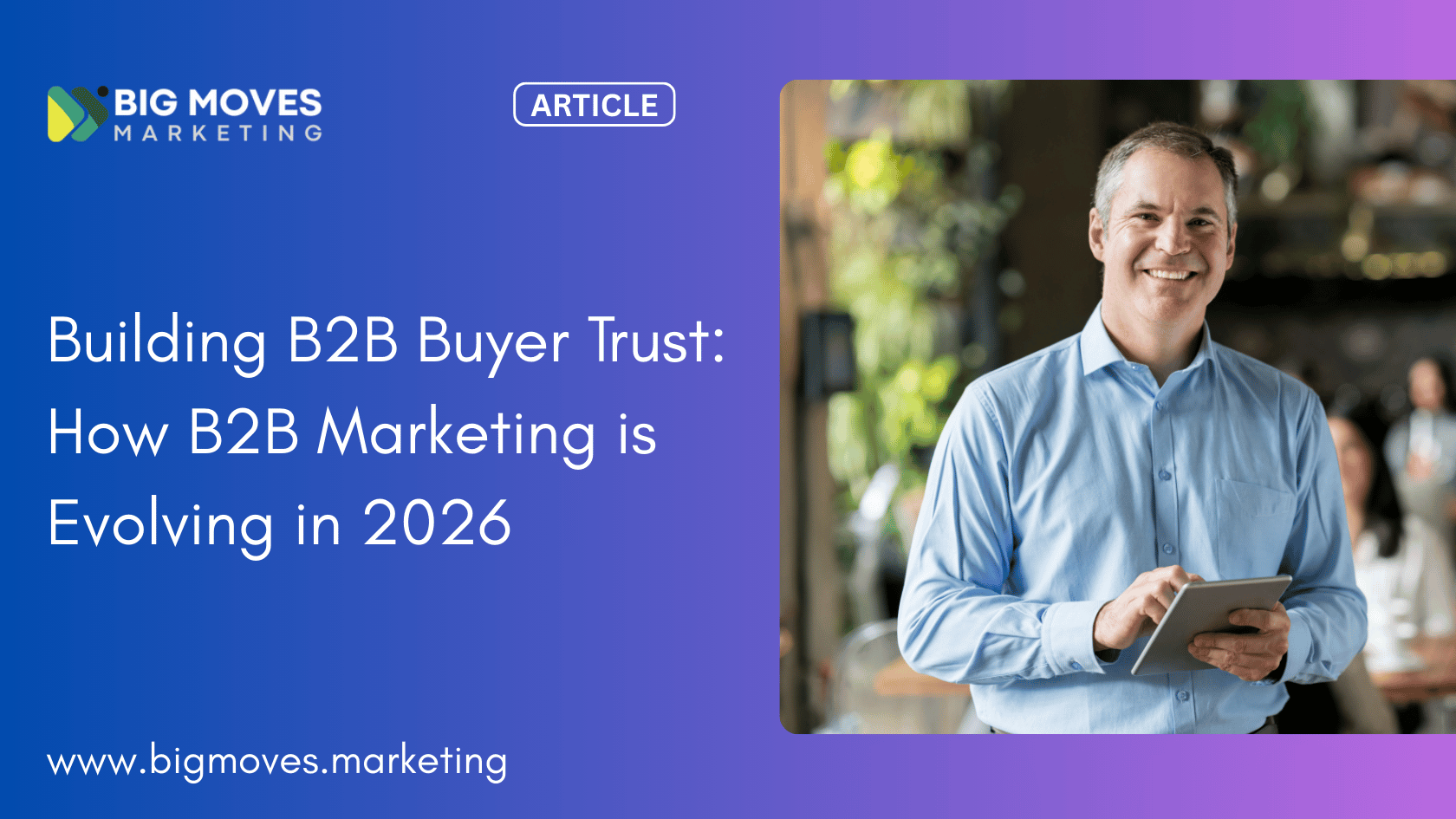


%20-%20white.svg)
